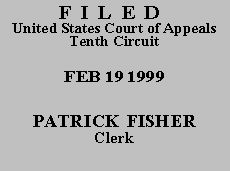

| ROBERT O. WOODS,
Petitioner-Appellant, v. KEN KLINGER, Respondent-Appellee. |
|
Petitioner appeals the district court's denial of habeas relief, see 28 U.S.C. § 2254, on his claim alleging that Oklahoma's Truth in Sentencing Act violated the Ex Post Facto Clause by eliminating the Electronic Monitoring and Specialized Supervision Programs, Okla. Stat. Ann. tit. 57, § 510.9 (amended 1997) and § 611 (repealed 1997).(2) See, e.g., Devine v. New Mexico Dep't of Corrections, 866 F.2d 339, 343 (10th Cir. 1989) (ex post facto clause precludes retroactive increase in actual time inmate must spend in jail prior to supervised release).
The Ex Post Facto Clause precludes application of a retrospective act that inflicts "a greater punishment, than the law annexed to the crime, when committed," because such application implicates "the central concerns of the Ex Post Facto Clause: the lack of fair notice and governmental restraint when the legislature increases punishment beyond what was prescribed when the crime was consummated." Lynce v. Mathis, 519 U.S. 433, 441 (1997) (quotations omitted). "To fall within the ex post facto prohibition, a law must be retrospective . . . and it must disadvantage the offender affected by it by altering the definition of criminal conduct or increasing the punishment for the crime." Id. (further quotations omitted).
The Oklahoma legislature, however, enacted the Electronic Monitoring and Specialized Supervision Programs in 1993, after petitioner had committed, and been convicted of, the crimes at issue here. The legislature's subsequent elimination of these programs, in 1997, did not increase the punishment prescribed at the time petitioner committed these criminal acts and, therefore, did not offend the Ex Post Facto Clause. See Weaver v. Graham, 450 U.S. 24, 30-31 (1981); see also Lynce, 519 U.S. at 447-49 (recognizing "force" of argument that retroactive changes in law enacted after conviction and sentence would not violate Ex Post Facto Clause).
The judgment of the United States District Court for the Western District of Oklahoma denying habeas relief is, therefore, AFFIRMED.
Entered for the Court
Circuit Judge
*. This order and judgment is not binding precedent, except under the doctrines of law of the case, res judicata, and collateral estoppel. The court generally disfavors the citation of orders and judgments; nevertheless, an order and judgment may be cited under the terms and conditions of 10th Cir. R. 36.3.
1. We grant petitioner's motion to proceed without prepayment of costs and fees. See 28 U.S.C. § 1915. We also grant his motions to file a supplemental reply brief and to strike the affidavits attached to respondent's brief, which were not submitted to the district court in the first instance. See, e.g., Aero-Medical, Inc. v. United States, 23 F.3d 328, 329 n. 2 (10th Cir. 1994).
2. This court previously granted petitioner a certificate of appealability as to this one issue. See 28 U.S.C. § 2253(c).